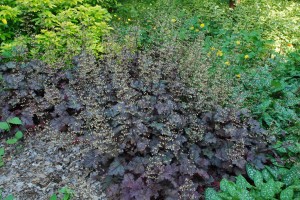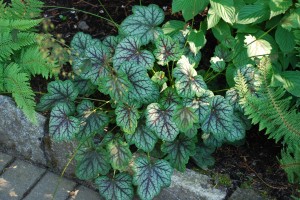Mt. Cuba Center Evaluates Heuchera (Coralbells) Cultivars
Over the past quarter century, gardeners have enjoyed a colorful heuchera (coralbells) revolution. Several great hybrid cultivars have been introduced with more new ones arriving every spring. Unfortunately, the flood of new cultivars has given us a huge number of poor performers. Gardeners across the U.S. have noticed that some cultivars excel in certain areas. For example, a poor performing cultivar in the Southeastern U.S. may flourish in Mid-Atlantic or Midwestern gardens.
Heucheras are herbaceous perennials with palmate leaves attached to a thick basal stem by long petioles. Foliage emerges in spring with a second growth flush in late summer unless plants are environmentally stressed. Foliage is reliably evergreen in zones 7-9.
There is an enormous selection of hybrid cultivars including leaves with ruffled margins, distinctive vein coloration, and other traits. While much interest among plant breeders has been with foliage, some outstanding flowering forms stand out. Native species like H. americana and H. villosa have contributed hardiness, vigor, and color. Generally, heucheras thrive planted in moderate shade or in full morning sun (in zones 5-7). Some “villosa hybrid” cultivars thrive under full day sun with frequent irrigation.
From 2012-14 Mount Cuba Center near Greenville, Delaware evaluated 83 varieties. The best performers were: Citronelle, H. villosa ‘Bronze Wave’, Cajun Fire, Color Dream, Steel City, Carousel, Apple Crisp, Frosted Violet, Southern Comfort, Spellbound.
Highly rated were: H. villosa ‘Autumn Bride’, Brownies, Creole Nights, Dark Secret, Guardian Angel, Miracle, Pinot Noir, Plum Pudding, Rachel.
How to use this data? Read the entire report on the Mt. Cuba website (filed under “research”). Information in this regional report will be of most value to gardeners in the Mid-Atlantic states or in zones 5-6. A 4-year heuchera trial was published by Dr. Richard Hawke at the Chicago Botanical Gardens (CBG) back in 2003 and may be viewed on the CBG website. Dr. Leonard Perry at The University of Vermont has also evaluated heucheras in past years.




